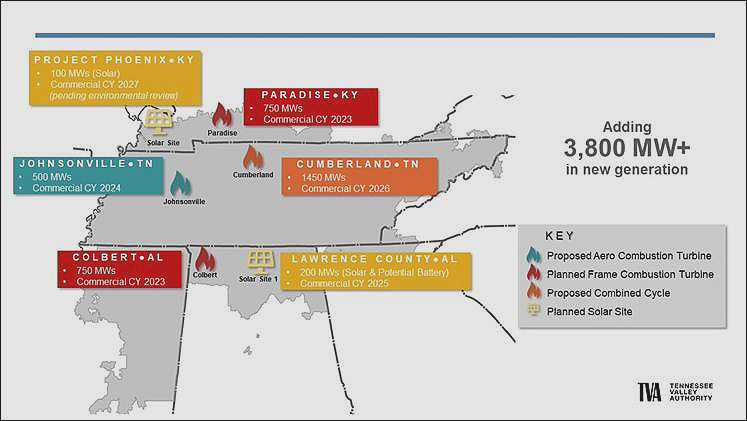Displaying items by tag: tva bull run
Tennessee Valley Authority faces a push to get greener and more transparent
 Nanette Mahler, left, and Tracy O’Neill walk along Macon Wall Road in Cheatham County, Tennessee, near the site of a proposed Tennessee Valley Authority gas power plant project. Local backlash against the proposal comes as the federal utility faces bipartisan legislation in Congress seeking to boost transparency in its planning process and scrutiny of TVA’s anemic renewable power growth compared to other utilities. Robert Zullo/States Newsroom
Nanette Mahler, left, and Tracy O’Neill walk along Macon Wall Road in Cheatham County, Tennessee, near the site of a proposed Tennessee Valley Authority gas power plant project. Local backlash against the proposal comes as the federal utility faces bipartisan legislation in Congress seeking to boost transparency in its planning process and scrutiny of TVA’s anemic renewable power growth compared to other utilities. Robert Zullo/States Newsroom
TVA ‘clearly a laggard’ in renewable energy
This article was originally published by Tennessee Lookout.
ASHLAND CITY — When he heard about the sale, Kerry McCarver was perplexed.
In 2020, the mayor of rural Cheatham County discovered that the Tennessee Valley Authority bought about 280 acres of rolling farmland “in the middle of nowhere” in his county, which lies just west of Nashville and is home to about 42,000 people.
He asked another county official who formerly worked for the TVA, the nation’s largest public power company, to find out what it planned to do with the land.
The answer they got was “future use,” and they speculated a solar farm might be in the works.
“It’s kind of the last we thought about it,” McCarver said during an interview in his office in May. “Then a year ago last summer, TVA called here needing a place to have a public meeting.”
The authority was now proposing a 900-megawatt natural gas-fired power plant, battery storage, pipelines and other associated infrastructure for the site, which came as a shock to McCarver and many other locals who felt it was wholly inappropriate for the area.
- tva
- tva clean energy
- tva board
- tva board meeting
- tva bull run
- tva coal fossil plant
- tva kingston
- kerry mccarver
- tva fossil plant
- tva gas plants
- cheatham county
- jeff lyash
- duke energy
- sierra club climate change
- southern alliance for clean energy
- stephen smith
- tennessee lookout
- tva governance transparency
- southern environmental law center
- energy alabama
TVA plans for Bull Run Fossil Plant site remain hazy
 A public playground near the site of the since-decommissioned Bull Run coal plant in Claxton, Tenn. Tennessee Valley Authority is weighing options for the site’s future. Abigail Baxter/Hellbender Press
A public playground near the site of the since-decommissioned Bull Run coal plant in Claxton, Tenn. Tennessee Valley Authority is weighing options for the site’s future. Abigail Baxter/Hellbender Press
Solar production and public green space remain options; coal ash questions remain
CLAXTON — Tennessee Valley Authority will demolish most structures at Bull Run Fossil Plant but has not yet shared plans for the ultimate disposition or reuse of the property.
Bull Run Fossil Plant was a coal-fired plant in the Claxton community, located just outside of Oak Ridge in Anderson County, Tenn. The plant opened in 1967. TVA closed it in 2023, and plans to phase out all its coal fired plants by 203.
The utility and its spokesman Scott Brooks have listed the scrubbers, coal handling structures and the large chimney, nicknamed the “lighthouse” by locals, as structures that will likely come down.
TVA has listed some possibilities for the site, including battery storage, park areas, “economic development” and a synchronous condenser, which is a device meant to keep the overall grid's power supply stable without generating any power of its own. This last option would involve keeping and repurposing the turbine building. TVA has not committed to any of these ideas.
To critics’ dismay, TVA plans to replace coal with natural gas. The utility also plans to double its solar supply.

Citizens call on TVA to stop passing gas
KNOXVILLE — The Tennessee Valley Authority in coming years plans to add both natural gas and solar plants to its portfolio to meet what it says are rising energy demands.
TVA’s Board of Directors laid out the federal utility’s plan in a meeting at Norris Middle School in May. Environmentalists at a previous hearing criticized the utility’s focus on natural gas rather than renewables or other measures. Other people, largely tied to local power providers, argued that a switch to renewable energy would be unreliable.
TVA showed a map in a press release following the meeting, showing four proposed natural gas plants and two proposed solar plants. Two of those natural gas plants would be in Tennessee while the other two are planned for Alabama and Kentucky. It stated these new plants will total 3,800 megawatts. It also spoke of its System Operations Center, set to open in fall 2024 in Georgetown to manage the utility’s grid. TVA also stated a desire to research nuclear technologies.
“Our region is experiencing growth at six times the national average, which means we must invest in our current power system and build new generation so we can continue meeting our region’s demand,” said TVA president and CEO Jeff Lyash.
Several citizens criticized TVA’s focus on natural gas plants and new pipelines at the listening session May 9. Among them was Clinton resident and activist John Todd Waterman.
- tva board
- tva board meeting
- tva climate change
- tva fossil plant
- climate action
- climate change appalachia
- jeff lyash
- system operations center
- natural gas
- natural gas power plant
- natural gas environment
- natural gas bad?
- tva kingston
- tva bull run
- john todd waterman
- tva systems operation center
- dana moran
- sierra club natural gas plant
- mark kimbell
- gallatin department of electricity
- coal plant replacement
- natural gas vs coal
- investment in new fossil fuel infrastructure
- fossil fuel
- fossil fuel industry
- fossil gas power plant
- tennessee valley authority
- climate change
- tva solar energy
- solar energy
- solar energy in tennessee
Water and waste on TVA agenda as utility plans Bull Run shutdown
 Bull Run Fossil Plant in Claxton, Tennessee, was originally commissioned 55 years ago but TVA is now soliciting public input on the best way to shut down operations. Tennessee Valley Authority
Bull Run Fossil Plant in Claxton, Tennessee, was originally commissioned 55 years ago but TVA is now soliciting public input on the best way to shut down operations. Tennessee Valley Authority
TVA solicits public input following release of environmental assessment for Bull Run Fossil Plant decommission
CLAXTON — Tennessee Valley Authority plans to close its Bull Run Fossil Plant (BRF) in Anderson County, but it’s still looking for public input on what comes next.
“As a large, inflexible coal unit with medium operating costs and a high forced outage rate, BRF does not fit current and likely future portfolio needs,” the federal utility said in a draft Environmental Assessment.
TVA is looking at three different options for the future of the structures still standing on the site by the Clinch River near Oak Ridge: taking down all structures; taking down some of them; or leaving everything standing. A recent report lays out the environmental consequences of each of these actions. The report, in draft form, is against that third choice, listing it as only an option for the sake of comparison.
“If the facility is left in the “as-is” condition, it likely would present a higher risk than Alternatives A or B for the potential to contaminate soil and groundwater as systems and structures degrade. As such, this alternative is not a reasonable alternative,” the draft states.
TVA stated its considering removing “all or most of the buildings and structures” on a 250-acre area. After closing the plant, but before any demolitions, TVA will begin by removing components that may be used at other TVA sites, draining of oil and fluids from equipment, taking ash out of the boilers, removing information technology assets, removing plant records and other tasks.
The Bull Run Environmental Assessment is 170 pages long and available for public review. It doesn’t directly tackle the coal ash storage conundrum that has grabbed the attention of politicians, nearby residents and environmental activists, because that issue involves separate regulations.
Ahead of retiring Bull Run Fossil Plant, TVA faces questions about the site’s toxicity

CLAXTON — Even though TVA is about to retire Bull Run Fossil Plant, water pollution issues related to it are still up for debate.
A water discharge permit hearing took place Thursday, Jan. 12 at the Tennessee Department of Environment and Conservation building, 761 Emory Valley Road in Oak Ridge.
If you missed the meeting, you can still provide comments by email to This email address is being protected from spambots. You need JavaScript enabled to view it. through Thursday, Jan. 26.
The permit would, if approved, allow releases of “cooling water, process wastewater and storm water runoff” from Bull Run Fossil Plant into the Clinch River and operation of a cooling water intake system. Environmental groups have concerns.
Tennessee Valley Authority plans to retire Bull Run Fossil plant by 2023. Over several years and at meetings, both connected to TVA and organized by activist groups, citizens have voiced concerns about water quality issues due to the continued coal ash waste TVA stores on the site. In advance of this meeting, representatives of the Sierra Club, Southern Environmental Law Center, Appalachian Voices, Statewide Coalition for Community eMpowerment and Center for Biological Diversity all signed a letter asking for TDEC to set standards for water pollution from coal ash based on available technology.
This story will be updated.